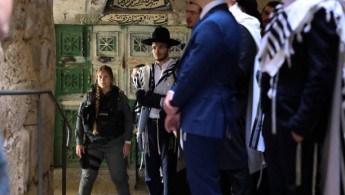Palestinians warn of 'temporal division' at Al-Aqsa as Israel halts settler raids
Israeli police will ban non-Muslims from holding prayers Al-Aqsa compound starting on Friday until the end of the Muslim holy month of Ramadan on May 2, reported Israeli media.
The decision was leaked, according to Israeli outlets, although it was expected as similar bans have taken place towards the end of Ramadan in recent years.
The move came as a top-US delegation is expected to tour the occupied Palestinian territories and Israel, as reported by the Israeli media, in an attempt to reduce the escalation in Jerusalem after Israeli settlers, backed by the Israeli security forces, stormed the Al-Aqsa compound over the past week.
Israel attacks Al-Aqsa again
— Dr Sardar Ali Shahbaz (@Alishahbaz_7) April 20, 2022
#LeakedVideo
#AlAqsaUnderAttack pic.twitter.com/fesuacd1VR
The ban is a return to the long-time established status quo of the holy esplanade, in place since the Ottoman era, and maintained by Israel after its occupation of East Jerusalem in 1967.
According to the status quo, non-Muslims would not be allowed to hold prayers in the compound. Given the present-day conditions, this decision is aimed at Israeli settlers, who by extension would not be allowed to storm the compound.
"The decision doesn't mean anything," Mohammad Abu Humus, a Palestinian activist in Jerusalem, who has been documenting Israeli stormings of Al-Aqsa in the last days, told The New Arab.
"They basically allowed settlers to storm the compound for a whole week, beating and forcing Palestinians out, and then to calm things down they decide to take a break for a week," he said.
Early on Wednesday, Israeli settlers aggressively entered the Al-Aqsa compound for the fourth day in a row. According to Abu Humus, who was present at the moment of the storming, "Israeli police entered the compound after 6:30 am and began to forcibly evacuate it."
"Israeli police officers pushed people, including elderly and even journalists all the way to the Hatta gate, one of the entrances of Al-Aqsa," said Abu Humus.
Israeli occupation forces attack a young Palestinian man with a broken arm at Al-Aqsa Mosque in occupied Jerusalem pic.twitter.com/sEKJHUsDIy
— PALESTINE ONLINE 🇵🇸 (@OnlinePalEng) April 20, 2022
"A few people locked themselves up in the southern mosque, where Israeli police fired rubber bullets towards the inside to keep them away from doors and windows, as Israeli settlers began their tour in the courtyard," he added.
Israeli policy towards Al-Aqsa is one of "imposing temporal division of the holy site", Nasser Al-Hedmi, president of the Jerusalemite Commission Against Judaization, told The New Arab.
"A return to the status quo after a week of violating it is imposing different realities at different times," he said. "This year, Israeli police has been more violent in evacuating Palestinian worshipers, because it aims at showing a strong fist and imposing the division."
"We have also seen how around 50 Palestinians were given orders to stay away from Al-Aqsa, and others were banned from entering based on changing criteria," Al-Hedmi said.
"Before last Friday, Israeli police banned Palestinian men under 45 from entering, and after that, it allowed in only residents of Jerusalem's old city," he pointed out.
"The aim is to have as few as possible of Palestinians in Al-Aqsa when settlers come in," he added.
Good morning. Here are some Israeli settlers chanting “Nakba, Nakba” in Al-Aqsa Mosque and “Abu Khdair!” referencing Palestinian child Mohammad Abu Khdair who was kidnapped, burned, and killed by Zionist settlers in 2014. The analogies make themselves. pic.twitter.com/FfgxM20lJ9
— #FreeAhmadManasra (@m7mdkurd) April 18, 2022
In the past week, Jews celebrated Passover, which coincides with the second half of the Muslim holy month. Israeli settler organizations called for the rebuilding of the Jewish temple at the site of Al-Aqsa had organized several stormings into the compound, in preparation for Passover.
Jewish Passover celebrations are set to end on Saturday, just as the last week of Ramadan begins, in which Muslims commemorate the "Night of Destiny" when Palestinians traditionally gather in large numbers at Al-Aqsa for night prayers.
Since 15 April, over 150 Palestinians were injured by Israeli security forces at the Al-Aqsa compound.





 Follow the Middle East's top stories in English at The New Arab on Google News
Follow the Middle East's top stories in English at The New Arab on Google News


